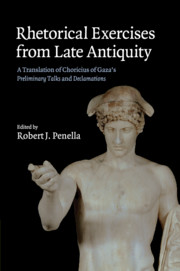 Rhetorical Exercises from Late Antiquity
Rhetorical Exercises from Late Antiquity Book contents
- Frontmatter
- Contents
- List of contributors
- Foreword
- Introduction
- I CHORICIUS, PRELIMINARY TALKS
- II CHORICIUS, DECLAMATIONS
- 2 Declamation 1 [X]:
- 3 Declamation 2 [XII]:
- 4 Declamation 3 [XIV]:
- 5 Declamation 4 [XVII]:
- 6 Declamation 5 [XX]:
- 7 Declamation 6 [XXIII]:
- 8 Declamation 7 [XXVI]:
- 9
- 10 Declamation 9 [XXXV]:
- 11 Declamation 10 [XXXVIII]:
- 12 Declamation 11 [XL]:
- 13 Declamation 12 [XLII]:
- Epilogue: The fortune and reception of Choricius and of his works
- Bibliography
- Index
11 - Declamation 10 [XXXVIII]: <Patroclus>
from II - CHORICIUS, DECLAMATIONS
Published online by Cambridge University Press: 29 January 2010
- Frontmatter
- Contents
- List of contributors
- Foreword
- Introduction
- I CHORICIUS, PRELIMINARY TALKS
- II CHORICIUS, DECLAMATIONS
- 2 Declamation 1 [X]:
- 3 Declamation 2 [XII]:
- 4 Declamation 3 [XIV]:
- 5 Declamation 4 [XVII]:
- 6 Declamation 5 [XX]:
- 7 Declamation 6 [XXIII]:
- 8 Declamation 7 [XXVI]:
- 9 Declamation 8 [XXIX]:
- 10 Declamation 9 [XXXV]:
- 11 Declamation 10 [XXXVIII]:
- 12 Declamation 11 [XL]:
- 13 Declamation 12 [XLII]:
- Epilogue: The fortune and reception of Choricius and of his works
- Bibliography
- Index
Summary
[THEME]
After Achilles was deprived of Briseis he withdrew into his own hut enraged. Agamemnon sent ambassadors to him, offering him back the girl along with very many gifts. But his embassy, with Briseis and the gifts, proved unsuccessful. In the short intervening time there were also many further misfortunes for the Greeks. Patroclus took notice of this and shared in their suffering; and with both tears and admonitions he tries to reconcile Achilles with the Greeks. Let us take the part of Patroclus.
EXPLANATORY COMMENT
[1] For what reason is Patroclus now troubled along with the Greeks, though the Thessalian [Achilles] does not at all feel this way? For the two are intimates and friends, and the maxim does require that “friends have all things in common.” For what reason, although he had earlier shared Achilles' anger, did he not maintain with him to the end that partnership of wrath? The poet resolved the difficulty, I think, by presenting to us the one as mild and easily brought to compassion – for he calls him “gentle” – but the other as rough and violent and also “lion-hearted,” as he adds in his poetry. [2] Therefore, given this lack of humane feeling it was necessary for the gentle one to be a counselor to the one who was not so. Consequently he stands beside him, shedding tears before him like a fountain, but [Achilles], the son of Peleus, did not know the cause for the lamentation.
- Type
- Chapter
- Information
- Rhetorical Exercises from Late AntiquityA Translation of Choricius of Gaza's Preliminary Talks and Declamations, pp. 200 - 221Publisher: Cambridge University PressPrint publication year: 2009


